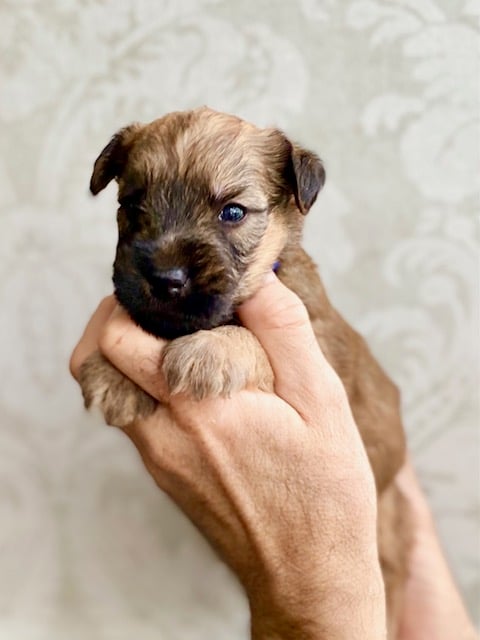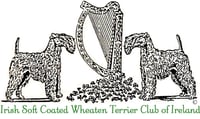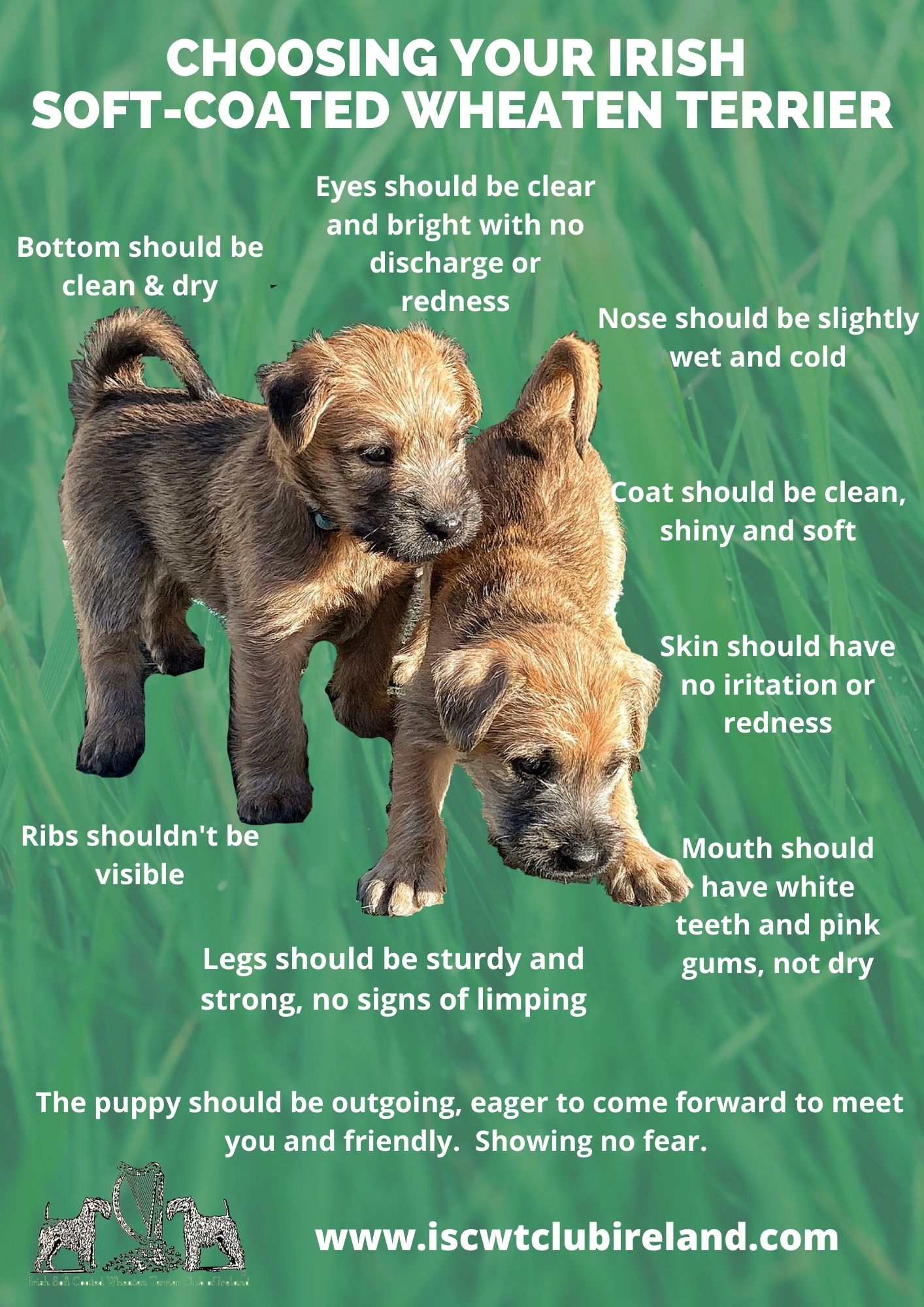Getting an Irish Soft Coated Wheaten Terrier
Dogs make wonderful companions and are part of the family in many homes in Ireland. But if you are thinking of acquiring a dog, please consider all the following questions, a lot of things need to be considered before you decide to bring home a new puppy, will a dog fit in well with your family? Does everybody in the family want a new pet?
Maybe! They are delightful dogs, good with families, very adaptable. On the other hand they require a good deal of effort and commitment from the owner, perhaps more than many other breeds. Between the need for grooming, training, exercise and socialisation, owning a dog is quite a commitment.
Have conversations with some Wheaten owners and you will have a better idea if you are up for the challenge.
No, their coats are not difficult to look after but do take a lot of time. Their coats require regular grooming. We would recommend brushing and combing the dog through about 2 or 3 times a week. As with all non-shed breeds the dead hair needs to be brushed out or the coat will matt and felt. The puppy coat can be quite short and harsh and would not need regular grooming, but we would recommend daily brushing to train the puppy to stand still, ideally on a table, and allow for the grooming to take place. If you want your wheaten to look like the photos you see with the beautiful loose shiny waves then you do need to put in the work. Stroking the top of the coat with a brush for a few minutes while sitting on the sofa is not grooming.
They will also need to bathed, some more often than others. However most people find it very rewarding and a very good bonding exercise. As they get older you can tidy them up with a scissors. If you have not been grooming your wheaten regularly and allow the coat to mat up, when you bring the dog to the groomers they will have no choice but to shave him with a clippers as this will be the kindest thing for the dog.
It is said by a lot of people the ISCWT are hypoallergenic, Wheatens are non-shedding, they are sometimes recommended for people with allergies and that can often be more easily tolerated than a shedding breed. However, allergic reactions are unique to each person. I believe to be sure you and your family most go and spend time with a Wheaten, some people are in fact allergic to the dogs saliva. So to be certain ask your breeder to visit and spend some time in their home. No good breeder will object to this as they want to ensure their dogs are going to their forever homes.
Getting a dog is like getting a new member of the family. Wheatens do need to be walked daily, the walks don’t need to be miles but can be if you choose to, and also have access to garden to play games. It is however extremely important not to over exercise your puppy, a rule of thumb could be 5 min per month of age. A puppy should never sit down with tiredness on a walk. You can go a couple of times a day.
Wheatens need your company and don’t enjoy spending time on their own for very long, if you do need to go out for longer than a few hours, someone to visit a is a must.
Have you planned where your Wheaten will sleep, will you use a crate? Many owners find it very useful to feed their Wheatens in a crate and let them sleep in one too. Besides the obvious benefits to this it is very useful to have an option to secure your dog when you have people visiting the house.
Wheatens are very good with children. Wheatens are sturdy and well-muscled, their tolerant good nature keeps them from becoming grouchy or snappy. Any young children and toddlers should be well supervised to prevent accidental injuries or tormenting behaviour. It’s a good idea for older children to attend training classes with your wheaten and to be involved in the training. It will be your responsibility to teach them to ‘Be Dog Smart’ – see www.BeDogSmart.ie for a real comprehensive interactive guide, well worth looking at if you are considering a puppy.
Wheatens may look sweet and cuddly but they are terriers, great caution must be taken if you are bringing them into a home with another pet. If the pet is old it might be kinder to wait until they have passed on as a new puppy can be very stressful on an old or infirm pet.
Irish Soft Coated Wheaten Terriers life expectancy is between 12 and 15 years of age they remain spritely and active even into their old age.
The Wheaten is a born Extrovert, with good humour and remarkable intelligence. They can easily get bored though, and be something of a rascal, testing the limits to see what they can get away with. Wheatens have minds of their own and many require a firm but loving owner to show what is expected from him. They instinctively want to please and learn quickly, with positive reinforcement and plenty of praise. A heavy hand is never needed with a Wheaten because despite their resilience, they are surprisingly sensitive. All puppies need training, it is very important you train your wheaten from a young age, a well-trained dog is an enjoyable dog to own.
There are ongoing costs to dog ownership such as food, toys, bed and grooming. Also you will have vets’ costs, some people choose to manage these with pet insurance others choose to save the premium as an emergency vet fund. Wheatens are generally a very healthy breed, but emergency procedures can happen with any breed.
Yes as said above Wheatens are a healthy breed, one of the advantages of buying a recognised breed of dog is responsible breeders have been monitoring their lines for years. If there are known hereditary problems responsible breeders will be testing for these. Ask what tests your breeders have done? We would like to see the following:
Please do not let the idea of hereditary tests worry you, it should in fact do the opposite, as recognised breeds we know what we are looking for unlike the designer breeds that are being produced now. Puppies should not have docked tails, it has been illegal in Ireland since 2014.
Possibly. The Irish Soft Coated Wheaten Terrier is a powerful, agile and athletic dog that requires regular exercise. If there is no enclosed outdoor safe space available you will need to provide several daily walks to maintain muscle tone and keep Wheatens fit and trim and to provide the necessary stimulation and socialisation to keep your dog happy, active and alert. Wheatens who live in apartments require at least three excursions outdoors each day (and puppies many more) regardless of whether it’s raining or if the owner is tired. If you rent your home now and have to move, please be aware that a lot of landlords will not allow you to have a pet, this is a really important consideration you do not want to have to surrender your Wheaten.
Most Wheatens do not bark as a hobby. They tend to reserve barking for warning. Wheatens are not a very destructive breed however they could very well dig in garden or possible chew items in your home. A lot of Wheatens will have digging instincts. Digging can be minimized or eliminated with training and by keeping your Wheaten exercised and entertained, use strong chew toys for supervised play.
Wheatens are good watch dogs but bad guard dogs. They have a very loud impressive bark and will alert you to strangers on your property. However Wheatens think everyone is the best friend they just have not met yet, so because of this they do not make a good guard dog. Wheatens don’t tend to bark very often, so if they do bark there is usually a good reason for it.
No, absolutely not, Wheatens are not kennel dogs. They do not do well as a kennel dog. They are a people dog who thrive with constant human companionship, living in the house as a member of the family. You will usually find your wheaten lying at your feet or curled up on the sofa with you.
This decision is up to the breeders, once they are over 8 weeks. It is a legal requirement that puppies are at least 8 weeks of age before being sold, this gives them time to be weaned from their mother. Has the puppy been wormed and vaccinated - some breeders will get puppies their first vaccination at 6-8 weeks of age before releasing them to their new owners. The vaccination certificate needs to be stamped and signed by a vet. All puppies must be microchipped by the age of 12 weeks or when transferring ownership, whichever comes first. Therefore all puppies must be accompanied by a microchipping certificate and both buyer and seller must complete the transfer of ownership form.
Anyone advertising a dog for sale must include the microchip number of the dog in the ad. You can check whether the microchip is a valid number by entering it into the Europetnet database at www.europetnet.com Ensure all the relevant paperwork is available for inspection when you visit the puppy. This should include a vaccination certificate, a health check report from a vet, a Pedigree and Kennel Club certificate. Remember, a Pedigree or Kennel Club certificate does not guarantee a perfect puppy - it is up to you to carry out the appropriate checks above.
It is illegal for any dog to be sold without a valid microchipping certificate – do not accept offers of any paperwork being posted at a later date!
Walk away. On arrival check whether the facilities appear clean and the puppies seem alert and healthy. There should be no discharge from their eyes or nose or any sores, or bald patches on the skin. The puppies should be alert and show no obvious signs of illness such as coughing. If your Wheaten appears unwell on collection, do not take him or her. Arrange with the breeder to return another day. If you have any doubts, choose another breeder. Follow your gut instinct. If you suspect a puppy has come from an unscrupulous breeder, please do not buy the puppy. You may be saving a dog but you will be fuelling this depraved trade. Also you could be setting you and your family up for heart break with an ill puppy.
Do not give a deposit to a breeder for a puppy that is not allocated to you or hasn't yet been born.
New rules on the sale or supply of pet animals came into effect on 1st February 2020. They are the Animal Health and Welfare (Sale or supply of pet animals) Regulations 2019 (No. 681 of 2019). These include that the Breeder most obtain and keep for 3 years the name and address of person they sold puppy to and date of sale.
Say no. If a breeder offers to meet you half way because their house if difficult to find, ask for the Eir code to put into your Sat Nav, if they are reluctant or hesitant walk away. Sometimes puppy farmers use a relative’s house as a meeting point so ask to see the other litter mates and parents and the mother, satisfy yourself that the puppies were reared in the house that you are in. If the seller asks you which breed puppy you have come to see, this may be an indication they have different breeds available and the home is potentially just a front. Many dogs are bred for a quick profit by what is often referred to as a ‘puppy farm’. They are raised without care or love and sold to unsuitable households.
Websites can be expensive to run and maintain and a lot of breeders do not need to market themselves like this. As we said earlier, a lot of breeders will have waiting lists, word of mouth is the best form of advertisement for nearly everything including puppies. If you meet a nice wheaten on the road and speak to the owners they might give you the name of their breeder.
You will need some sort of way to secure your Wheaten puppy for their journey home, a small crate or box and a cosy blanket. You should line the crate with newspaper as puppies are quite likely to soil in the car when they are not used to it. You breeder should give you a diet sheet and ideally some of the food the puppy has been eating or else have given you the name beforehand so you can have bought some. It’s better not to change the food straight away as the puppy will be having a lot of new experiences. Some people will have given a towel or blanket to the breeder on their first visit so that the puppy can bring something familiar smelling home with him.
All dogs require a dog licence in Ireland, which are available at the Post Office. Currently you can buy an annual licence for €20 or a lifetime licence for €140, given the longevity of the breed this can be a good option.
Once you bring your puppy home it is over to you to continue the good rearing that the puppy has hopefully enjoyed already. Once inoculated you can start training classes or visit local parks where you can meet other dogs. Always ask the other owner is it ok for your puppy to say hello.
Also all dogs do well with routine, establish feeding times and bed times. When you have fed them bring them outside straight away and wait for them to go to the toilet, you can create a word for this if you wish. Also have fresh clean water available to drink. It is ok to have this outside.
Introduce your puppy to new people, other animals, new experiences, objects and new situations, this imperative to ensuring a well-rounded dog.
Also you must clean up after you wheaten when out in public, always bring an extra poo bag or 2 so you don’t get caught out.
You should register your Wheaten with your local vet as soon as you have them home, become familiar with their opening hours etc.
You also need to transfer ownership of the dog into your name, this means if your wheaten is lost or stolen if the authorities recover your dog they know by scanning the chip who the rightful owner is. In practice this means you can be reunited with your pet quickly.
Choosing a puppy and a breeder
Start by locating a good breeder by contacting your local Kennel Club or Association (Irish Soft Coated Wheaten Terrier Club of …) contact the breeder and have a conversation on the phone. The breeders will be interviewing you as well, to see if they believe you are a suitable person for one of their puppies. Breeders will be happy to talk to you and answer your questions.When you go and visit the breeder overall appearance and cleanliness of the property is an obvious giveaway. Do not go and meet someone at local petrol station visit their home and see the mother with her puppies. Are the breeder's older dogs healthy, well behaved and friendly? It will give you an idea on what your puppy will be like as an adult. Have a good look at the mother (dam) and father (if possible) of the puppies before you choose one. The pedigree of the puppies should provide an experienced breeder with an insight into what your puppy will grow to be. Discuss with them, don’t be afraid to ask questions. It is also prudent not to bring you re children on your first visit to see the puppies you do not want to fall victim to pester power.


A lot of breeders could have waiting lists for their puppies. Good breeders are always popular, puppies may not be available as soon as you decide you are ready, expect to wait and if you are on a breeder’s waiting list please let them know if you get a puppy elsewhere.
Are the pups raised indoors with plenty of human interaction right from the start? Your breeder performs the all important role of beginning the puppy’s socialization process and house training, a lot of breeders will use noise CD s to help socialise puppies, these can be very beneficial. How do the puppies react to being handled, the pups should also be very comfortable with being handled by people of all shapes and sizes.
Ask all kinds of questions - don't hold back. A good breeder will be happy for you to ask just about anything. Ask about the puppies food requirements, the breeder should supply you with a diet sheet, and some of the food they have been feeding the puppies. They should also be able to suggest where you can buy the food. Make sure the breeder will provide you with basic instructions regarding your puppy. Things like health care advice (vaccinations, worming), feeding schedule information and also ongoing support should be offered. They should also give you some tips on grooming your Wheaten puppy. Although they will not have a full coat till after two it is important to regularly groom the puppy coat as a training exercise.
Put your trust in a good breeder when choosing a dog, they will have your best interests at heart. Listen and take on board their advice and recommendations.
At first, observe the litter without disturbing them. Look out for things like how the pups interact with each other. An active, playful pup is very desirable, however if all the puppies have been feed recently the likely hood is they will all be curled up in a big heap asleep.
Do a general visual health check of each puppy. They should be nice and round - not fat, and certainly not skinny. Have a close look at the pups eyes, ears, gums, teeth and rear end. You want to see bright eyes, a shiny and clean coat, and no sign of any discharge or debris.
The puppies should be confident, look out for a little pup who struts up to you and your family with head held high and tail wagging with excitement. A bit of a cheeky lick on the hand is also ok. Wheatens love to lick !
Be wary of a shy and fearful pup when choosing a puppy. Pups at the 8-10 week stage shouldn't show any sign of these undesirable traits. Many people end up selecting a puppy such as this because they feel sorry for them. Don't fall into this trap - it is not a valid reason for picking out a puppy! It's no good for anyone and you will most likely regret your decision for many years to come.
Pick the puppy up when you are sitting comfortably, hug him and cradle him. This is a bit of a test, if he reacts by squealing and wriggling and doesn't settle down, this is not a good sign. You may experience problems with a puppy such as this. A little struggle is ok, followed by quickly settling down and peering back up at you. Be guided by the breeder regarding letting children near the puppies.

.jpeg)
Check the Vet records of your puppy including vaccination and worming record. Also check that your Puppy is micro-chipped. It cannot be registered with the Irish Kennel club if it is not micro-chipped .
Choosing a puppy is an important step towards ensuring you end up with a healthy, well adjusted and happy long term companion Once you've made the big decision and chosen your puppy it is advisable to have your Veterinarian do a thorough examination of the pup. A lot of breeders will encourage this practice. It is a good idea to keep in touch with your breeder via email and by sending them some photos, they can also be a fountain of knowledge, it will be much easier for you to contact them with any problems you are having if you have kept the lines of communication open.
Once you bring your puppy home it is then your responsibility to provide proper socialization and obedience training. This will shape the temperament and behavior habits of your puppy and set him up to thrive in society. Wheatens need good basic training of sit and stay, leave it and the recall.
| Hips | |
| Eyes | |
| Elbows | |
| PLN | |
| Kidney Ultrasound |


.jpeg)

.jpg)




